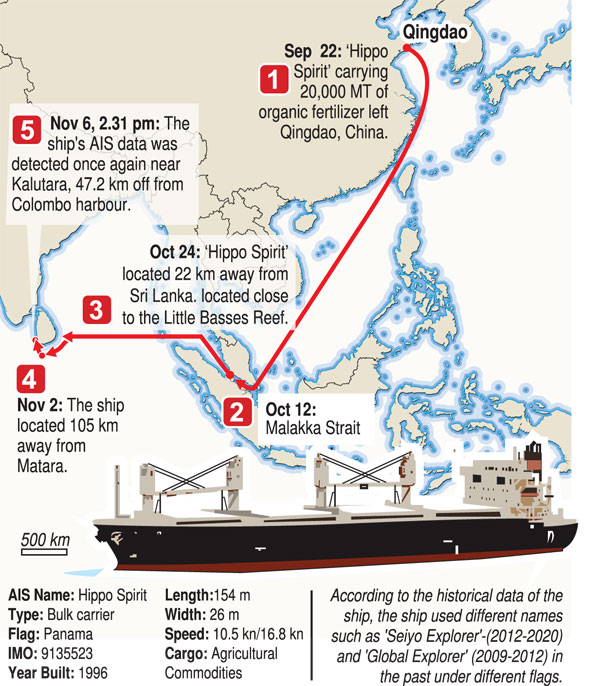News
Despite court order, controversial Chinese fertiliser ship inching towards Colombo Port
View(s):The cargo vessel carrying contaminated fertiliser from China – now in the eye of a diplomatic and legal storm — was yesterday tracked in Sri Lanka’s waters off Beruwela, inching towards the Colombo Port.
Sri Lanka Navy spokesman Indika de Silva told the Sunday Times yesterday the ship was in the waters of Sri Lanka’s Exclusive Economic Zone under the “innocent passage” provisions of international maritime law with the 20,000MT of fertiliser destined for Sri Lanka and found to be contaminated.
 The vessel continued in Sri Lankan waters while the Attorney General informed the Commercial High Court that the Chinese fertiliser exporter had withheld information from the People’s Bank that the shipment contained harmful bacteria.
The vessel continued in Sri Lankan waters while the Attorney General informed the Commercial High Court that the Chinese fertiliser exporter had withheld information from the People’s Bank that the shipment contained harmful bacteria.
Meanwhile, the Sri Lanka Ports Authority (SLPA) has been instructed by the Agriculture Ministry to block the discharge of any cargo from bulk carrier “Hippo Spirit” even though the local agent is yet to inform the SLPA of the ship’s intended arrival, said Harbour Master Nirmal P Silva.
“By following standard procedure for port call and if the permits are cleared, the ship can arrive in the port and supplies can be provided but the cargo will not be allowed to be discharged,” Capt Silva said. Keeping the ship anchored in international waters costs around USD 30,000 a day as maintaining charges to the shipping company.
Meanwhile, President Gotabaya Rajapaksa has summoned relevant ministers, officials and MPs overseeing fertiliser distribution efforts for a meeting tomorrow to review the situation and examine farmer protests over the lack of fertiliser.
The meeting at the Presidential Secretariat will take place amidst the commercial dispute over the cargo of Chinese organic fertiliser from Qingdao Biotech Group Co. Ltd.. Sri Lanka has rejected the cargo on the basis that it contained contaminated substances. Earlier, the Chinese Embassy’s Economic and Commercial Section blacklisted the People’s Bank of Sri Lanka for defaulting on payments in contravention of the Letter of Credit (LC) and contract.
The Agriculture Ministry will hand over a report to the Chinese Embassy early next week detailing reasons leading to the tussle on the import of Chinese fertiliser and the Ministry’s stand.
The State Ministry tasked with Production and Supply of Fertiliser and Regulation of Chemical Fertilisers and Insecticide Use is compiling this report which will explain decisions taken under local regulations.
“It seems the Embassy has taken the point of view of the company alone,” Ministry Secretary Udith Jayasinghe said. “We would like to clarify certain matters on why we took certain decisions, according to local laws and regulations.”
Earlier, the Ceylon Fertiliser Company obtained an enjoining order from the Colombo Commercial High Court against Qingdao Biotech Group Co. Ltd., its agent in Sri Lanka, and the People’s Bank. It prevents the People’s Bank from making any payment under the LC opened in favour of the Chinese company. This intervention was after Chinese-made organic fertiliser samples were tested by by the National Plant Quarantine Service (NPQS) and found to be contaminated with the harmful pathogen Erwinia tracheiphila.
Appearing for Ceylon Fertiliser Company, Additional Solicitor General (ASG) Susantha Balapatabendi, PC, told the Colombo Commercial High Court this week that when opening the LC, Qingdao Biotech had withheld from the People’s Bank test reports on the presence of harmful bacteria in its fertiliser stocks.
The company had submitted just one of three reports on tests carried out on samples of its organic fertiliser stock to the People’s Bank, ASG Balapatabendi said. Two reports confirming the presence of harmful bacteria were withheld.
Qingdao Biotech lawyers countered that, claiming that before opening the LC, the Chinese company had informed the Ceylon Fertiliser Company that there could be “harmless microorganisms”. The Sri Lankan company had nevertheless opened the LC, having full knowledge of this position. They also said neither test reports issued from China nor through the nominee of the Sri Lanka Standards Institution confirm the presence of harmful bacteria in the samples.

